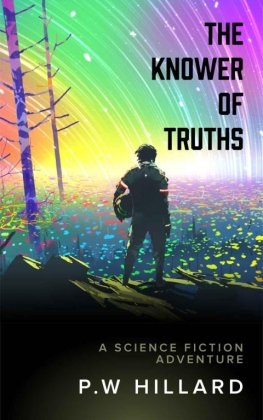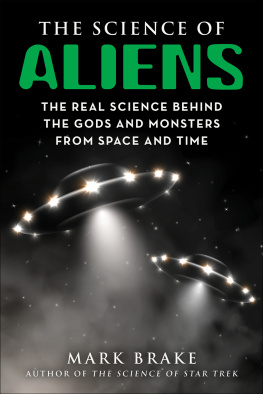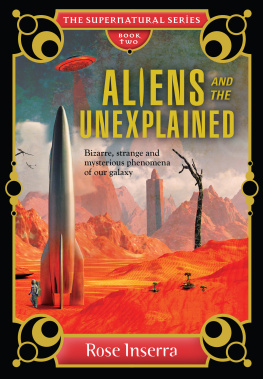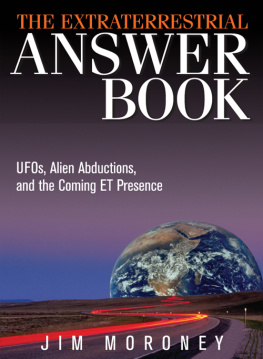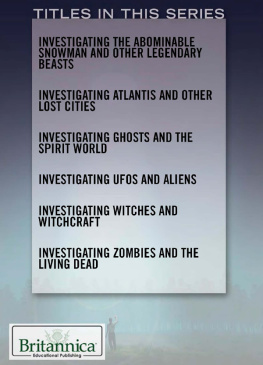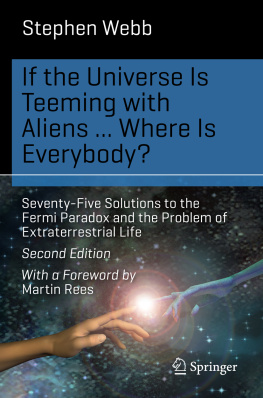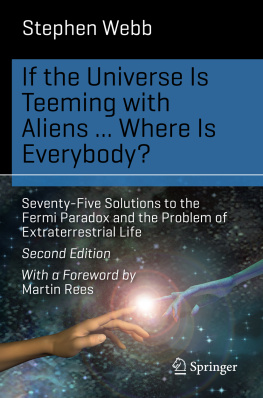ALIEN UNIVERSE
ALIEN UNIVERSE
Extraterrestrial Life in our Minds
and in the Cosmos
DON LINCOLN


2013 The Johns Hopkins University Press
All rights reserved. Published 2013
Printed in the United States of America on acid-free paper
9 8 7 6 5 4 3 2 1
The Johns Hopkins University Press
2715 North Charles Street
Baltimore, Maryland 21218-4363
www.press.jhu.edu
Library of Congress Cataloging-in-Publication Data
Lincoln, Don.
Alien universe : extraterrestrial life in our minds and in the cosmos / Don
Lincoln.
pages cm.
Includes bibliographical references and index.
ISBN-13: 978-1-4214-1072-2 (hardcover : alk. paper)
ISBN-13: 978-1-4214-1073-9 (electronic)
ISBN-10: 1-4214-1072-9 (hardcover : alk. paper)
ISBN-10: 1-4214-1073-7 (electronic)
1. Life on other planets. 2. Exobiology. 3. Extraterrestrial beingsSocial aspects. 4. Extraterrestrial beings in popular culture. I. Title.
QB54.L487 2013
576.8939dc23 2012051094
A catalog record for this book is available from the British Library.
Special discounts are available for bulk purchases of this book. For more information, please contact Special Sales at 410-516-6936 or specialsales@press.jhu.edu.
The Johns Hopkins University Press uses environmentally friendly book materials, including recycled text paper that is composed of at least 30 percent post-consumer waste, whenever possible.
ACKNOWLEDGMENTS
Books are never a solo effort. To convert an idea to a finished product takes the contributions of many.
Even the first idea can incorporate contributions from many people. This book wouldnt exist in its current form, were it not for my wife, who listened to my initial sketchy ideas and helped me weave them together into a coherent whole. The idea to interleave our evolving idea of Aliens with the concerns of the public at the time is entirely hers, and she also greatly clarified the presentation of several of the scientific topics I covered. Any residual rough spots in the execution are from when I stubbornly didnt listen to her.
Drs. Hassan Al-Ali, Albert Harrison, Judi Scheppler, Jill Tarter, and Erica Zahnle all provided expert advice on the text, correcting the misconceptions and errors. I am very grateful for their efforts and to Alvaro Amat for making helpful connections.
I would like to thank Patty Hedrick, Dr. Julie Dye, and Meredith Carlson for their assistance in procuring the drawings of Aliens, as imagined by children. I also thank both the Fermilab library and the Geneva Public Library staff for their invaluable assistance in finding original sources. The UFO literature is replete with fakes and manufactured facts. To cut through various writers agendas, it is imperative to confirm everything with original documents.
I am grateful to Linda Allewalt, Meredith Carlson, Sue Dumford, Vida Goldstein, Lori Haseltine, Dee Huie, Nancy Krasinski, Diane Lincoln, Toni Mueller, Robert Shaw, and Felicia Svoboda for being test readers. In addition to a myriad of typos, they helped identify weaknesses in the original manuscript that I hope I have removed. Michele Callaghan should get special mention for her deft copyediting. Finally, I would like to thank my publicist Kathy Alexander for her tireless efforts.
While these people all contributed directly to this book, it goes without saying that the information and tales recounted here wouldnt have been possible without generations of historians and scientists. Human knowledge is a cumulative endeavor, and what Ive gathered here is really the work of hundreds of people.
It is traditional in my books to assign blame to a specific childhood friend of mine for any unnoticed residual errors. However it would be inappropriate to mention his name in a book that talks about Aliens, whom some think already walk among us. It wouldnt be right to blow his cover.
ALIEN UNIVERSE
PROLOGUE
THE QUESTION
The beginning is the most important part of any work.
Plato
One of the Biggest Questions of All
Of all the things that could change mankinds outlook, one of the biggest would be contact with intelligent life originating from another world. There have been similar paradigm-shifting episodes before in the history of humanity. When Galileo first saw the moons of Jupiter in about January of 1610, it marked the beginning of the end of the idea that Earth held a unique location in the cosmos. The publication of his manuscript Starry Messenger in Venice just two months later began the spread of the knowledge that someone had incontrovertible evidence that our planet could no longer be viewed as exceptional. The genie was out of the bottle.
Another paradigm-shifting event was the death of human exceptionalism, developed by Charles Darwin and his contemporaries. The idea that humans are but a twig on the vast tree of life forever changed our vision of ourselves as a unique species that had been given the Earth as our birthright. We became animals, like countless others, undoubtedly one with tremendous power to shape the globe, but still just a cousin species among many; one who had been shaped by the same forces that created the bear, the shark, and the kangaroo. Humanitys exceptionalism was reduced to our ongoing pride of our intellect and technical achievement.
While we know of other species on Earth who use tools and have a degree of intelligence, the discovery of no other species comparable to us has allowed some to continue to believe humanity to be exceptional and that it has been given, as the Bible says, dominion over all living things. Even the non-religious might point to our spread from Africa across the globe, exploiting all environments and all niches, as a kind of Manifest Destiny of species. Taken to an extreme, some dream of a future in which mankind has left the Earth and spread across the cosmos, in a triumphant march of galactic conquest.
But what kind of galaxy will we encounter? Setting aside the very real practical difficulties associated with interstellar travel, is the galaxy a lifeless and sterile place, with the Earth being a unique and precious cradle of intelligent life? Or is the universe instead a cosmopolitan neighborhood, with many planets inhabited by species intellectually and technologically similar to our own? In short, we must ask a single important question.
Are we alone?
My purpose in writing this book is to explore that question. While imaginative thinkers have long speculated on the possibility and nature of life on other worlds, it was in the twentieth century that the idea has become common throughout Western culture. Unlike in early centuries, where discussions of alien life was the purview of the intellectual or academic, the idea of aliens has penetrated the literature, newspapers, movies, and other sources of information enjoyed by the public. The idea of Aliens, UFOs, alien contacts, abduction, interspecies reproduction, and so on, all exist to various degrees in the literature available to everyone.
This leads us to the fundamental question of the book. If Aliens exist, what do they look like? Or, even more specific still, what have members of the ordinary public thought Aliens look like over time? If you walked into a coffee shop in Greenwich Village in New York and asked the guy behind the counter what Aliens looked like, what would he say? What sort of answer would you get if you stopped instead for coffee in a diner in Ottumwa, Iowa? Or asked the same question 50 years ago?
Next page

